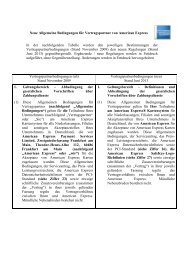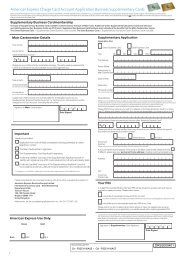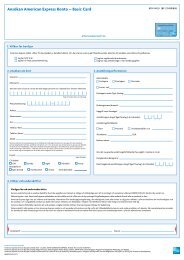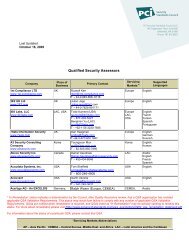Sending an Employee Overseas - American Express
Sending an Employee Overseas - American Express
Sending an Employee Overseas - American Express
You also want an ePaper? Increase the reach of your titles
YUMPU automatically turns print PDFs into web optimized ePapers that Google loves.
<strong>Sending</strong> <strong>an</strong> <strong>Employee</strong> <strong>Overseas</strong><br />
There are a slew of issues to underst<strong>an</strong>d when your business sends someone<br />
to <strong>an</strong>other country to work. From visas, to pay issues, here are some of the<br />
things you have to bear in mind.<br />
By Charles Slack<br />
In <strong>an</strong> ever more global economy, tr<strong>an</strong>sferring U.S. employees overseas may seem as natural<br />
a decision as sending them from one state to <strong>an</strong>other. Yet overseas employment presents a<br />
host of special fin<strong>an</strong>cial, tax, <strong>an</strong>d cultural questions that should be addressed early in order to<br />
make the tr<strong>an</strong>sition smooth <strong>an</strong>d avoid hassles <strong>an</strong>d expense to employer <strong>an</strong>d employee alike.<br />
“Too m<strong>an</strong>y employers make a mistake by saying, ʻletʼs open a br<strong>an</strong>ch abroad <strong>an</strong>d deal with<br />
problems as they arise,ʼ” says Giselle Carson, <strong>an</strong> attorney with the law firm Marks Gray in<br />
Jacksonville, Florida, whose areas of specialty include overseas employment issues. “This is<br />
definitely not the same thing as moving <strong>an</strong> employee from Jacksonville to Connecticut.”<br />
One consideration involves tax pl<strong>an</strong>ning <strong>an</strong>d whether to pay employees in dollars or the local<br />
currency. Because shifts in the exch<strong>an</strong>ge rate could signific<strong>an</strong>tly impact the employeeʼs<br />
salary, this question should be settled in the contract, before the assignment begins, Carson<br />
says.<br />
As Americ<strong>an</strong>s, <strong>an</strong>d because of the solidity of U.S. currency, employees often prefer to be<br />
paid most of their salary in dollars, Carson says. At the same time, theyʼll need local currency<br />
for everyday expenses, <strong>an</strong>d const<strong>an</strong>tly exch<strong>an</strong>ging money at street rates c<strong>an</strong> be <strong>an</strong><br />
expensive nuis<strong>an</strong>ce.<br />
M<strong>an</strong>agers with large numbers of overseas workers may find it convenient to establish special<br />
employee checking accounts through a multinational fin<strong>an</strong>cial firm, according to hum<strong>an</strong>
esources specialist Paul Brunell. These accounts allow employees to withdraw pay in either<br />
currency.<br />
While such arr<strong>an</strong>gements may be impractical for small firms, employers may still be able to<br />
negotiate guar<strong>an</strong>teed exch<strong>an</strong>ge rates through a foreign exch<strong>an</strong>ge comp<strong>an</strong>y, says Brunell<br />
who served as <strong>an</strong> international hum<strong>an</strong> resources executive for several major comp<strong>an</strong>ies<br />
before starting his own consult<strong>an</strong>cy for small <strong>an</strong>d mid-sized firms in Atl<strong>an</strong>ta. Other tips:<br />
Factor in all of the costs. Supplying benefits such as living quarters <strong>an</strong>d security (if<br />
needed), c<strong>an</strong> drive costs up to several times the actual salary, says Brunell, so make sure<br />
youʼve got the proper amount budgeted. Also, keep in mind that these perks may create local<br />
tax obligations for your employee. “They c<strong>an</strong> wind up getting hung out to dry with a tax bill,”<br />
Brunell says. The employer should factor in enough extra salary to enable the employee to<br />
cover the taxes on those perks.<br />
You may also be subject to the employerʼs share of whatever local social security or other<br />
entitlements apply. In m<strong>an</strong>y countries, these c<strong>an</strong> be signific<strong>an</strong>tly higher th<strong>an</strong> in the United<br />
States.<br />
Get local knowledge. Whenever possible, <strong>an</strong> employer should visit the country in question,<br />
or send <strong>an</strong> adv<strong>an</strong>ce team, to familiarize themselves with local laws <strong>an</strong>d customs. Consider<br />
consulting a U.S. lawyer familiar with international hum<strong>an</strong> resource issues. While the attorney<br />
wonʼt know everything about every country, he or she may be able to advise <strong>an</strong>d help you<br />
with the process, the questions to ask, <strong>an</strong>d perhaps provide a referral to a reliable local<br />
lawyer. Especially import<strong>an</strong>t is to underst<strong>an</strong>d <strong>an</strong>d abide by local visa rules, which of course<br />
vary from country to country.<br />
Whether the motivation is staying competitive in a global economy, or aggressively exp<strong>an</strong>ding<br />
oneʼs customer base, sending employees overseas c<strong>an</strong> have terrific rewards, Carson says.
But she adds: “Just remember that finding <strong>an</strong>d hiring the right person for the job is only the<br />
beginning of the process.”<br />
Charles Slack is the author of several books <strong>an</strong>d numerous business <strong>an</strong>d fin<strong>an</strong>cial articles. His<br />
business books include The Communicators: Leadership in the Age of Crisis (co-author, 2010) <strong>an</strong>d<br />
Hetty: The Genius <strong>an</strong>d Madness of Americaʼs First Female Tycoon.
















